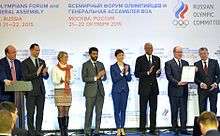World Olympians Association

The World Olympians Association (WOA) is an association of olympic athletes ("Olympians") from all over the world, to promote the dissemination of Olympic ideals and fair play, advance environmental protection, educate against doping and drug use, supply educational resources, work against violence and intolerance, support diversity and equality, contribute to sport-related charities, host special hospitality centres, involve Olympians in social support, display positive role models, advance sport management and promote a culture of which sport is an important part.
An Olympian is any athlete who has been accredited to participate at a Summer or Winter Olympic Games. Olympians are WOA members through their local National Olympians Associations. Globally, there are over 100,000 Olympians.
IOC President Juan Antonio Samaranch created the World Olympians Association following the Centennial Olympic Congress, Congress of Unity, held in Paris in 1994. Formally, the WOA was established during a meeting held in the Olympic Museum on 21 November 1995 by 25 founder members.
In November 2011, Joël Bouzou, an Olympic medalist from France, was elected President of the Association. Joël is the founder of Peace and Sport and the Secretary General of the International Modern Pentathlon Federation (UIPM).
In January 2012, Prince Albert II of Monaco was announced as Patron of the Association. Both the Prince and his wife Princess Charlene of Monaco are Olympians.
Objectives
- To encourage contact between Olympians, in support of Olympism and the Olympic Movement, as set forth in the Olympic Charter.
- To educate Olympians to become good ambassadors of the Olympic Movement
- To promote the establishment of National Olympians Associations.
- To foster cooperation between National Olympians Associations, in furtherance of the objectives of the WOA
- To support and represent the interests of Olympians and contribute to the enhancement of their quality of life.
- To motivate Olympians towards active leadership in their respective local communities and countries of residence.
- To support the participation of Olympians in activities where they can serve as role models who embody the Olympic ideals.
- To implement development programs as appropriated.